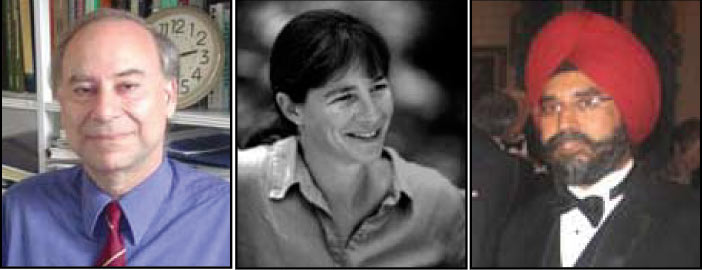The Common Threat
By Craig Considine
Washington, DC
 Left
to right: Dr. Akbar Ahmed, Dr. Rebecca Gould and Dr.
Rajwant Singh
Left
to right: Dr. Akbar Ahmed, Dr. Rebecca Gould and Dr.
Rajwant Singh |
Ambassador Akbar Ahmed
welcomed guests from the worldwide interfaith community to
the Kay Spiritual Center at American University to participate
in a unique panel discussion to examine how interfaith dialogue
can play a role in protecting the environment.
The panel was sponsored by members of the British Embassy,
the Greater Washington Interfaith Power and Light Center,
and the Kennedy Political Union of American University.
While this topic is an aberration from the typical discussions
of a gathering of such groups, it gives a fresh perspective
on a serious global issue that transcends religion. The panel
was established to discuss and examine ways in which members
of different religions view contemporary environmental issues
and how different faiths can work together to solve the world’s
challenges. Issues such as poverty, the AIDS epidemic, starvation,
global warming, and climate change are all part of our collective
environment. The solutions to environmental problems are the
responsibility of the whole interfaith community, regardless
of religious belief.
Dr. Ahmed, Ibn Khaldun Chair of Islamic Studies and the moderator
of the panel, introduced the challenges facing the environment
as a “life and death struggle” for all of humanity.
Ahmed began the conference with reference to an Islamic position
on the preservation of the environment. He made a specific
note to the 7th century Caliph Abu Bakr’s Rules of War.
Ahmed explained that Abu Bakr’s first rule was that
no religious representative should be touched in war, nor
should women, children, or vegetation and crops, because all
belong directly to Allah or God. Ahmed addressed Islam’s
highly developed sense of legacy in protecting the environment
from the ravages of man. Specifically, when man disrespects
the environment, he is essentially disrespecting himself and
all mankind.
Among the other speakers involved in the panel was Reverend
James Jones, The Bishop of Liverpool, England. Jones explored
the relationship between the Christian faith and the preservation
of the environment. He made note to several passages in The
Bible, seven in total in the Gospels, that include the name
Jesus and the Earth in the same sentence. Jesus, according
to Reverend Jones, realized that mankind and the earth were
intertwined as one under the power of God. Throughout his
speech, Jones continuously referred to the African proverb
“we have borrowed the present from our children.”
The purpose of this passage was to show how important it is
for people today to take care of the environment so that our
children will not have to deal with self-inflicted damage
that has potentially fatal consequences.
Dr. Rajwant Singh, Chairman of the Sikh Council on Religion
and Education of the Greater Washington Interfaith Power and
Light Organization, spoke on behalf of the Sikh faith and
ways in which its history is directly tied towards preserving
the environment. Singh, speaking on behalf of all faiths,
said that “man is part nature” and that everything
on earth is a universal manifestation of God. He noted that
“spirit and nature is but one” is a powerful and
historical passage of Sikhism that can help understand our
relationship as human beings to the environment. One Sikh
belief that Singh made note of is that “heaven is on
earth only if we love nature and each other.” Singh
reiterated the comment made earlier by Dr. Ahmed, that global
warming is a threat to all people, not just members of specific
faiths. Global warming shows no prejudice.
The final speaker of the panel was Dr. Rebecca Gould, an Associate
Professor of Religion and Environmental Studies at Middlebury
College. Gould sent a powerful message by claiming it does
not take one kind of religion to solve environmental problems,
but rather the cooperation of members of all faiths. To her
“the issues are moral and spiritual.” She recommended
for human beings to find hope and optimism as ways to conquer
environmental problems. Human beings must emphasize religious
pluralism and interfaith dialogue and to rid itself of theological
and personal interests. In conclusion, she called for the
“rebirth” of environmentalism through interfaith
dialogue, not only as a way to improve relations between different
faiths, but to also improve the environment that we live in.
We owe this to each other.
Dr. Ahmed concluded by asking all members of all faiths to
take a step back and evaluate the damage we are doing to the
environment. The health of our environment will be the preeminent
issue of the 21st century. Members of all faiths must take
an active approach and work together to curb this problem.
As secular leaders, it’s time to focus on environmental
issues because we are all one. Failure to take care of the
environment, in which we are all intertwined with, hurts everyone.
The speakers at this event demonstrated that the root of each
religion is a belief that we are liable to God for the condition
of the Earth. We all owe it to each other to take care of
our precious environment, because as the environment suffers,
so will man.
-------------------------------------------------------------------------------------

